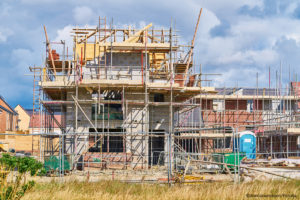
Following the Housing White Paper announcement, LABM garners a cross section of opinion from housing associations, contractors, housebuilders, procurement groups and industry bodies facing the sector.
Hyde Group buoyed by government’s moves to make the housebuilding market more competitive.
David Gannicott, Group Director, Business Development said: “The Hyde Group welcome the Government’s White Paper on Housing. We are pleased with the plans to try and break the log jam in the planning process. It is our firm belief that our strategic plan together with the necessary political drive from across the political divide in local and national forums will help the Government in their desire to create one million homes by 2020. We are also buoyed by moves to make the market more competitive particularly for SMEs and those embracing modern methods of construction.”
Extra support for MMC could go a long way to helping LAs and HAs, but new ways of building homes shouldn’t be adopted without a full assessment of the risks says Zurich Municipal.
Allison Whittington, head of Housing at Zurich Municipal, said: “We welcome the Housing White Paper and the Government’s commitment to tackling the UK’s housing shortage. Our housing association and local authority customers will particularly welcome the measures to help them build much needed new homes across the country.
“Extra support for Modern Methods of Construction (MMC) could also go a long way to helping councils and registered providers deliver high-quality homes in less time. But new ways of building homes shouldn’t be adopted for new developments without a full assessment of the risks. We are also clear that the Building Regulations must be adapted to reflect the new methods of construction being used across the housing sector.
“We were also pleased to see the various measures to encourage proactive approaches to flood risk management and resilience at local level. Given that future flood events are a certainty, it is vital that all our local authorities develop a long-term, sustainable risk management strategy.”
Lovell welcomes attempts to increase housing supply and support shown to provide more rented housing.
Peter Quinn, Partnerships Director at Lovell commented: “Lovell welcomes the Government’s attempts to increase housing supply, which is something the country desperately needs. Well thought-through local plans could be a key contributor to provide certainty for developers but for this to happen, planning departments need more resources — we are pleased that the White Paper appears to recognise this issue. We also welcome the support shown to provide a greater amount of rented housing, be it affordable or private.
“The requirement for greater speed of construction, including using modern methods of construction, is a strategy that Lovell embraces and is already delivering. If it is to really work then the Government can assist greatly by making land available to people like ourselves who are willing to rise to this challenge.”
Housing associations and local authorities empowered to build more homes.
Dave Sheridan, CEO of Keepmoat, said: “We welcome the publication of the Housing White Paper. We’re pleased to see that the Government recognises the need for modern methods of construction and acknowledges the need for estate regeneration, as well as for Help to Buy and institutional investment in new rented homes. For us the most significant development is that housing associations and local authorities will be empowered to build more homes. Going forward the challenge for the Government is to ensure that real change actually happens.”
Self-delivery by local authorities: “Councils, desperate to take control of supply and build more homes, will be disappointed not to see the relaxation of HRA borrowing restrictions. Borrowing is the biggest single issue and they will continue to be dependent on the combination of finance that can be raised through private sector partners and the pots of funding announced recently by the Government.
“The white paper offers bespoke deals with local authorities in high demand areas, but using a package of existing measures. This could reveal some effective models for achieving greater volume, but in the short-term successes will be highly localised.”
“Partnership projects could deliver more if local authorities are able to dispose of land to their partners at less than best consideration. They will have to take a hit on their capital receipts from the land, but can make up for that with the long-term rental income from new homes.”
Modular homebuilding: “We share the Government’s confidence in modular construction, but think more could have been done to establish the order book needed for investment by manufacturers. We’re keen to see more detail on exactly how the Home Builders Fund can be accessed, but are disappointed that there is no mention of fast tracking procurement through the HCA. It’s good to see that the Government recognises the need to establish a joint working group with all involved to ensure that mortgages are readily available.”
Starter Homes: “Any attempt to apply the same rules to every site risks undermining viability, but a 10% quota for affordable home ownership is unlikely to require a substantially different approach from the norm, especially when there is freedom over which schemes make up that 10%. What was important to us was that Starter Homes made additional development possible. The £1.2bn Starter Home Land Fund promises to do that.”
Private rented sector: “Build to Rent is key to meeting the demand for more high quality accommodation for private rent. Newly built homes in the private rented sector, supported by institutional investment, will relieve pressure on the market and improve the range of affordable housing options. We support the ambition to encourage more institutional investment and we’re also pleased to see the government looking to establish longer-term tenancies, especially for local authorities delivering private rented homes through local housing companies.”
Retirement living: “We welcome the Government’s commitment to the requirements of older people who need more affordable right-sizing options. Helping them to move will create much needed fluidity in the market. We therefore strongly support plans to introduce a new statutory duty, through the Neighbourhood Planning Bill, to produce guidance for local planning authorities on how their development documents should meet the housing needs of older and disabled people.”
Government’s Housing White Paper is a step in the right direction says Stonewater.
Nicholas Harris, Chief Executive at Stonewater, said: “For years, the Government’s house-building programme has focused on home-ownership, ignoring one in three Britons who cannot afford to buy. Yesterday’s Housing White Paper is a step in the right direction and indicates a shift in Government housing strategy towards a more balanced approach to building new homes, which meets the needs of people in all financial circumstances. It is good to see a focus now on creating more low-cost rental homes as well as proposals to speed up housing construction and free up public land and brownfield sites for more affordable housing across all tenures.
“We welcome the clarity on the Government’s position that housing associations belong in the private sector, and we look forward to understanding more about plans to implement the necessary deregulatory measures to allow housing associations to be classified as private sector bodies once more. We also await with interest, for further details on the new rent policy for the period beyond 2020.
“Housing associations are responsible for almost a third of all new homes built in England, making a significant contribution to tackling the housing crisis and creating thousands of new jobs in the construction industry. Stonewater is pleased that the Communities Secretary, Sajid Javid MP has recognised the vital role housing associations play in delivering the right mix of housing where it is most needed. We look forward to responding to the Housing White Paper consultation shortly.”
Whitepaper ‘Fixing our broken housing market’ focuses on off-site construction of modular homes.
The White Paper highlights the use of modular factory-built homes to provide the much needed homes across England. Pulse Modular Homes is already expanding its footprint and working with both local authorities and housing associations to deliver innovative solutions in site selection — above carparks, using old banks of dilapidated garages, old gasometers and other brownfield sites.
Michael Stockdale joint CEO of Pulse, said: “We really welcome government’s commitment to provide more housing and its recognition and support of the role modular housing can play in delivering really good quality homes quickly.
“What is encouraging is that the innovation drive of the whitepaper is already being recognised by councils and housing associations. One of our housing schemes, which is in partnership with North Lincolnshire Council above a Scunthorpe town centre carpark, is a perfect example of how this can work.”
The whitepaper highlights the productivity gap in traditional building and the lack of skilled workers. Modular housing increases productivity by 50/60% and attracts skilled workers to work in clean factories where trades can be scheduled without any weather problems and with all the building materials to hand.
An additional benefit of using modular construction is the significant reduction in noise, waste and vehicle movements during the site build — an important factor when developing sites in urban locations.
 White Paper places local authorities at centre stage of country’s housing challenge.
White Paper places local authorities at centre stage of country’s housing challenge.
Mark Robinson, Scape Group Chief Executive, commented: “The Housing White Paper puts local authorities centre stage of the country’s housing challenge. The Government has rightly recognised the role that councils can play in delivering new homes, and it is about time that they were given the powers to do so — but the government must also give them the resources they need.
“Without the planning and regeneration officers needed to process applications and complete Local Plans, the Government’s aspiration for hundreds of thousands more new homes will fall flat. Simply chastising overwhelmed and under-resourced local authorities through a new monitoring system won’t speed things up. The Government has paid lip service to the financial pressure on planning and regeneration departments, but a crack team of super-planners and special deals for larger authorities will not be enough to tackle a national housing shortage.
“However what is clear is that the experience of local authorities across joint venture partnerships, major infrastructure projects and housebuilding is now beginning to be recognised. Local councils increasingly have the expertise, vision and understanding of their area to provide the new homes that local people need. The government must continue to unlock the potential of local authorities to solve the housing crisis through new and innovative means — give them the funding and the finance, combined with new powers, and we could be on the cusp of a locally-led housebuilding revolution.”
Government White Paper published following CPS report calling for action on housing.
The Centre for Policy Studies welcomes the publication of the Government White Paper on the future of Britain’s housing market, Fixing Our Broken Housing Market. Last week the Centre for Policy Studies report Housing: Now is the Time to Seize the Opportunity highlighted the changing attitudes towards house building — including a significant reduction in the number of people who oppose construction in their local area — and outlined proposals to increase the number of homes built each year.
The White Paper incorporates several ideas set out in the CPS report — including a national standard by which local councils can assess their future housing needs — and references the CPS publications directly: “The Government is already supporting a new wave of garden towns and villages, and will work with these and any future garden communities to ensure that development and infrastructure investment are as closely aligned as possible. We will also legislate to allow locally accountable New Town Development Corporations to be set up, enabling local areas to use them as the delivery vehicle if they wish to. The Government will also explore what opportunities garden cities, towns and villages might offer for bringing large-scale development forward in ways that streamline planning procedures and encourage locally-led, high quality environments to be created. The Centre for Policy Studies proposed the idea of ‘pink zones’ with this goal in mind and we are looking carefully at their recommendation.”
Keith Boyfield, a co-author of the Pink Planning series, says “We particularly welcome the invitation in the Housing White Paper for comments on our ideas relating to streamlined planning procedures which we term ‘Pink Zones’”.
Quiet revolution needed to shake up how we deliver UK’s housing needs says CBI.
Rhian Kelly, CBI Infrastructure Director, said: “A quiet revolution is needed to shake up how business and the Government deliver the UK’s housing needs, so this White Paper is a welcome step in the right direction.
“The intention to deliver a diverse mix of homes — especially affordable homes to rent — is particularly good news. We have called for the ‘one size fits all’ approach to housing to be ditched, and are glad to see a move to building the right homes in the right places that fit the actual needs of people and communities.
“It’s encouraging the Government is looking at how to make it easier for small and medium-sized businesses to succeed in the market. Taking a clearer, more strategic approach to public land release will also see more bricks being laid, so we welcome the Government turning its eye to this developing area.”
Landlords have a responsibility to ensure housing is fit for habitation says CIEH.
Tony Lewis, Head of Policy at CIEH, said: “More young people and families are renting their homes long-term and plans to extend the length of tenancy agreements is a step in the right direction. This will give occupants more security, an opportunity to make a home for themselves and put down roots in their local communities.
“At the same time, landlords have a responsibility to ensure accommodation is fit for people to live in as housing conditions have a significant impact on physical health and mental wellbeing. New homes need to be built to modern standards and there is also a need to ensure the older housing stock is brought up to 21st Century standards.
“Plans to build new homes are desperately needed but developers and councils need to ensure that any brownfield land developed is properly decontaminated. Environmental Health officers have a vital role in working with their planning colleagues to ensure new developments are built quickly as well as being fit for purpose.”
 Strategic, financial and governance skills needed to ensure housing policy recommendations are translated into delivery.
Strategic, financial and governance skills needed to ensure housing policy recommendations are translated into delivery.
Simon Wing, Housing Partner at GatenbySanderson, commented: “We welcome policy changes designed to help meet UK housing demands, but policy itself won’t deliver change. The Government’s white paper sets out hurdles for housing associations to jump using innovative and sustainable solutions. The harsh reality is that the strategic, financial and governance skills needed to ensure that these recommendations translate into delivery are short.
“Despite this being an exciting time for the housing sector with opportunities to flourish as a result of the new recommendations, leaders of today need to give clear direction and come equipped with the strength of character to cope with challenges ahead.”
BSRIA welcomes Housing White Paper setting out Government’s preferred strategy in tackling the country’s housing crisis.
Tassos Kougionis, Principal Consultant – Residential, at BSRIA’s Sustainable Construction Group, said: “BSRIA welcomes this timely and very important ‘radical blueprint for change’. This heralds a new era for housing, with fresh opportunities for members and industry alike.
“But we must not forget that building homes is a matter of quality as well as quantity. Our current focus on delivering volume makes quality more important than ever. Government, industry and stakeholders all need to work together to guarantee that communities’ needs and wellbeing are at the very centre of our decisions. Indeed, that these new homes will be well thought through and designed accordingly.
“We must ensure that in order to tackle this very challenging housing crisis we are not building the costly slums or soulless estates of tomorrow.
“With regard to innovation, modern methods of construction, ‘offsite’ manufacturing and zero waste approaches — I believe they signify an exciting new era for the industry which shall be explored more as it may offer the potential we are seeking to delivering these high targets.
“What is also very important is to see how SME housebuilders can be supported, and increase in numbers, as a more diverse housing delivery model can enhance the industry’s ability to deliver the required numbers while creating new jobs and opportunities that will help in increasing our workforce.
“As ever, it is crucial that industry has access to a workforce with strong engineering and construction skills.
“BSRIA has highlighted skills and labour shortages, on a number of occasions in the past. We commit to assisting in delivering the workforce, skills and knowledge required. We will continue to engage with Central Government, local authorities and industrial partners offering new informative material, new training opportunities and our professional and scientific expertise and services where required to support the delivery of a high quality, healthy, safe and striving future built environment.”








